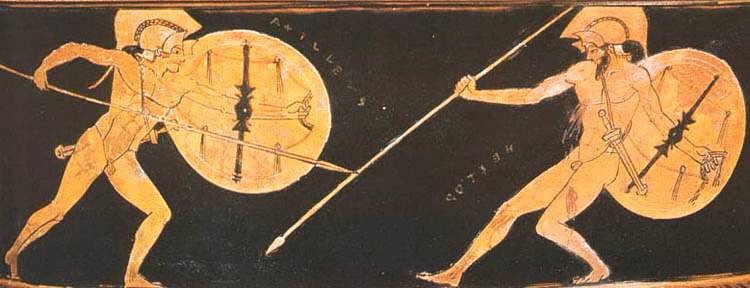
Καλὸν μὲν οὖν ἐστιν ὃ ἂν δι’ αὑτὸ αἱρετὸν ὂν ἐπαινετὸν ᾖ, ἢ ὃ ἂν ἀγαθὸν ὂν ἡδὺ ᾖ, ὅτι ἀγαθόν· εἰ δὲ τοῦτό ἐστι τὸ καλόν, ἀνάγκη τὴν ἀρετὴν καλὸν εἶναι· ἀγαθὸν γὰρ ὂν ἐπαινετόν ἐστιν. ἀρετὴ δ’ ἐστὶ μὲν δύναμις ὡς δοκεῖ ποριστικὴ ἀγαθῶν καὶ φυλακτική, καὶ δύναμις εὐεργετικὴ πολλῶν καὶ μεγάλων, καὶ πάντων περὶ πάντα· μέρη δὲ ἀρετῆς δικαιοσύνη, ἀνδρεία, σωφροσύνη, μεγαλοπρέπεια, μεγαλοψυχία, ἐλευθεριότης, φρόνησις, σοφία. 6 ἀνάγκη δὲ μεγίστας εἶναι ἀρετὰς τὰς τοῖς ἄλλοις χρησιμωτάτας, εἴπερ ἐστὶν ἡ ἀρετὴ δύναμις εὐεργετική, <καὶ> διὰ τοῦτο τοὺς δικαίους καὶ ἀνδρείους μάλιστα τιμῶσιν· ἡ μὲν γὰρ ἐν πολέμῳ, ἡ δὲ καὶ ἐν πολέμῳ καὶ ἐν εἰρήνῃ χρήσιμος ἄλλοις. εἶτα ἐλευθεριότης· προΐενται γὰρ καὶ οὐκ ἀνταγωνίζονται περὶ τῶν χρημάτων, ὧν μάλιστα ἐφίενται ἄλλοι. ἔστι δὲ δικαιοσύνη μὲν ἀρετὴ δι’ ἣν τὰ αὑτῶν ἕκαστοι ἔχουσι, καὶ ὡς ὁ νόμος· ἀδικία δὲ δι’ ἣν τὰ ἀλλότρια, οὐχ ὡς ὁ νόμος. ἀνδρεία δὲ δι’ ἣν πρακτικοί εἰσι τῶν καλῶν ἔργων ἐν τοῖς κινδύνοις, καὶ ὡς ὁ νόμος κελεύει, καὶ ὑπηρετικοὶ τῷ νόμῳ· δειλία δὲ τοὐναντίον. σωφροσύνη δὲ ἀρετὴ δι’ ἣν πρὸς τὰς ἡδονὰς τὰς τοῦ σώματος οὕτως ἔχουσιν ὡς ὁ νόμος κελεύει· ἀκολασία δὲ τοὐναντίον. ἐλευθεριότης δὲ περὶ χρήματα εὐποιητική, ἀνελευθερία δὲ τοὐναντίον. μεγαλοψυχία δὲ ἀρετὴ μεγάλων ποιητικὴ εὐεργετημάτων μικροψυχία δὲ τοὐναντίον, μεγαλοπρέπεια δὲ ἀρετὴ ἐν δαπανήμασι μεγέθους ποιητική, μικροψυχία δὲ καὶ μικροπρέπεια τἀναντία. φρόνησις δ’ ἐστὶν ἀρετὴ διανοίας καθ’ ἣν εὖ βουλεύεσθαι δύνανται περὶ ἀγαθῶν καὶ κακῶν τῶν εἰρημένων εἰς εὐδαιμονίαν.
(Aristotle, Rhet. 1.9.1366a-b)
Now kalon describes whatever, through being chosen itself, is praiseworthy or whatever, through being good [agathon], is pleasant because it is good. If this, then, is the kalon, then virtue is necessarily kalon; for it is praiseworthy because of being good [agathon]. Now virtue [aretē] is an ability [dynamis], as it seems, that is productive and preservative of goods, and an ability for doing good in many and great ways, actually in all ways in all things. The parts [or subdivisions] of virtue are justice, manly courage, self-control, magnificence, magnanimity, liberality, gentleness, prudence, and wisdom. Since virtue is defined as an ability for doing good, the greatest virtues are necessarily those most useful to others. For that reason people most honor the just and the courageous; for the latter is useful to others in war, and the former in peace as well. Next is liberality; for the liberal make contributions freely and do not quarrel about the money, which others care most about. Justice [dikaiosynē] is a virtue by which all, individually, have what is due to them and as the law requires; and injustice [is a vice] by which they have what belongs to others and not as the law requires. Manly courage [andreia] [is a virtue] by which people perform fine actions in times of danger and as the law orders and obedient to the law, and cowardice is the opposite. Self-control [sophrosynē] is the virtue through which people behave as the law orders in regard to the pleasures of the body, and lack of control [is] the opposite. Liberality [eleutheriotēs] is the disposition to do good with money, illiberality [is] the opposite. Magnanimity [megalopsykhia] is a virtue, productive of great benefits [for others], and magnificence [megaloprepeia] is a virtue in expenditures, productive of something great, while little-mindedness [mikropsykhia] and stinginess [mikroprepeia] are the opposites. Prudence [phronēsis] is a virtue of intelligence whereby people are able to plan well for happiness in regard to the good and bad things that have been mentioned earlier. (tr. George A. Kennedy)









